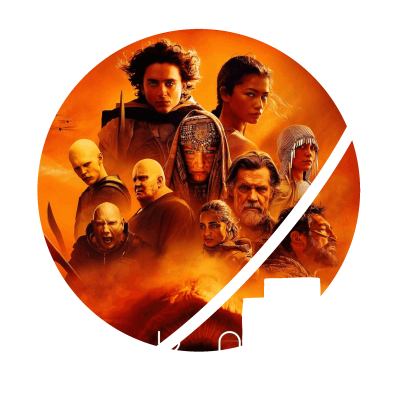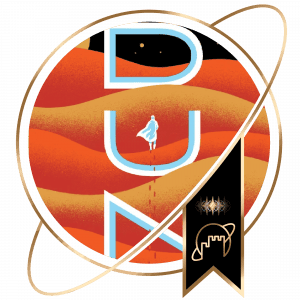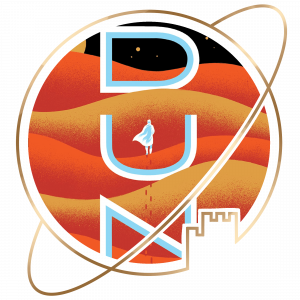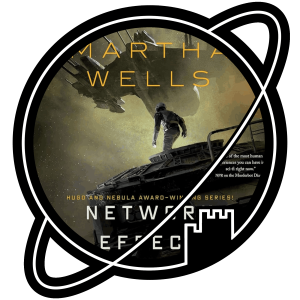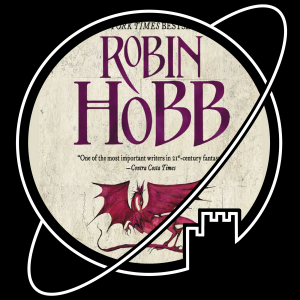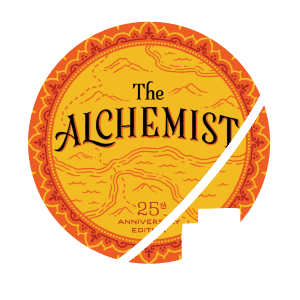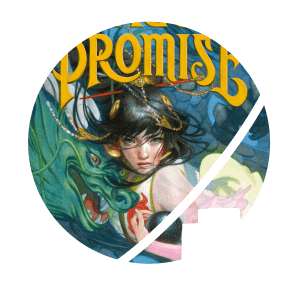- Movie directed by Denis Villeneuve
- Based on the novel Dune by Frank Herbert
- Starring Timothée Chalamet, Zendaya, Rebecca Ferguson, Josh Brolin, Austin Butler, Florence Pugh, Christopher Walken, Stellan Skarsgård and others
- Released 1 March 2024
- Runtime: 165 minutes
- Part Two in the Dune movie trilogy

In my review of the first part of Denis Villeneuve’s Dune-adaptation, I described my near-religious experience when I finally got to see one of my favourite novels come to life on the big screen. Watching Dune: Part One is probably my very favourite cinema experience ever. I felt the first Dune-adaptation delivered at every turn, and I couldn’t wait for the second part to be released.
So how did Dune: Part Two hold up?
First: Dune: Part Two is an absolutely incredible cinema experience. Please don’t miss out on the opportunity to be rattled out of your chair by the sounds and positively run over by the visuals of this movie.
On the whole, Part Two ticks all the same boxes that Part One does: great visual design, stunning shots, terrifying and heartbeat-raising music, believable and moving character moments, and plot and logic that are barely within grasp.
There is one important difference though: Part Two is actually quite different from Part One in its adaptational choices. Where Part One is incredibly faithful to Herbert’s novel, Part Two deviates quite a bit more. To some extent, this was inevitable: a lot happens in the novel, politics and deception with layer upon layer of depth that just don’t hold up well in a movie adaptation.
That threw me off a bit when I watched the first time. Especially because Dune: Part One was so faithful, I kept expecting certain things to happen, which then didn’t.
But now that I’ve seen the movie a few more times, I understand the adaptational choices a lot better. The novel Dune needed streamlining to work as a movie, even if split into two two-and-half-hour behemoths. It is simply not possible to give every character and every scene from the book their due. Paul’s internal struggle needs to be made visual for the public. It needed to happen that way, because even as it is, I’ve gotten a lot of question on the how or why from people who’ve not read the books.
Some of Villeneuve (and screenwriter Jon Spaihts)’s choices are different from what I might have come up with. For example, they made Paul’s choices a lot more binary, a lot more clear cut. But I get what they did. They retained the cornerstones of Paul’s story, and told a streamlined version of what happens in between.
And that streamlined version of the story absorbs you as you watch it. I heard some people complain that Part One was a bit slow for their liking; Part Two keeps your attention every second. I feel like the pace is really high in between the scenes, but sufficiently slow during the scenes that there is room for character moments. There are enough juicy action scenes for the movie not to get boring, but the movie is not about the action. Dune: Part Two separates itself from other sci-fi blockbusters in being thought-provoking. Who are the good guys, at the end of the day?
I might have to admit that Dune: Part Two did not quite bring that semi-religious high I got from watching the first movie in the trilogy. There are a few nit picks that I don’t have the space to explore in this review. Overall, though, this is Dune brought to the big screen and it is amazing – and if you have not seen it yet, you are missing out on the sci-fi event of the year.

Let me preface my review with the caveat that – contrary to some other curators here – I’ve seen this second instalment of the Dune-series only once while writing this review. As with its predecessor, it was a delight to watch this movie on the big screen in Peter’s company. Unlike its predecessor, this movie had much more scenes with Zendaya, which – though her appearance would normally give any piece of content a great advantage when it comes to my appreciation of it – was all in all not enough to totally win me over.
Dune: Part Two is not a bad movie. However, now that I’ve had some time to think about it, I can also say with certainty that I don’t think it’s necessarily a good movie either. Though Peter mentions the pacing as one of Dune: Part Two’s strong points, in my experience the contrary was true. There were many times I felt the story was dragging, something I had less problems with during Dune: Part One. This might mostly be due to me having read the book. I have a tendency to root for underdogs in stories. Whereas the first movie, depicting protagonist Paul’s fall from power, was very engaging in that regard, in this movie it never really felt like he was out of control at any moment. His internal struggles – a big component in the book – fell somewhat flat on screen. Meanwhile, all his political opponents seem too distant to be a real threat to Paul and his goals.
Similarly, due to the first movie’s faithful adaption, I went into this movie with more expectations than I should have done. One of my favourite storylines in the book concerns my boy Thufir Hawat, a character that is painfully absent in Dune: Part Two. Though I certainly understand the creative choices that were made, such as omitting some storylines and simplifying others (let’s be frank (herbert), the book is quite a complex piece of work), I was not always happy to see them.
Still, even when I detach the movie from my experiences with its predecessor and the book, this changes little for me. Maybe Dune is ultimately not a story for me, despite me having a great fondness for many of its themes. Or maybe, it’s just the writing of this specific movie that doesn’t appeal to me.
The worms were once again a sight to behold though, and the acting was still great. By the way, did I already mention Dune: Part Two heavily features Zendaya?






